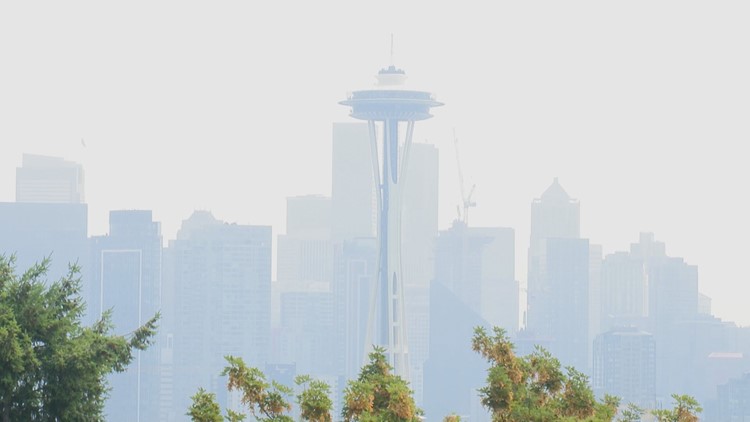SEATTLE — An Air Quality Alert was extended for most of western Washington Monday as wildfires burn all around the Pacific Northwest.
The alert will expire Monday at midnight, but air quality was slow to improve Monday afternoon.
Seattle saw air quality levels among the worst in the world on Sunday. It had the worst air quality index (AQI) in the United States, with a 105 rating as of 5:20 a.m. Monday, according to IQ Air.
Late in the day, air quality slowly improved. By 9:30 p.m., the AQI was around 50, putting it in the moderate category, before dropping farther in the good category in the 10 p.m. hour.
Winds shifted overnight Friday into Saturday morning, bringing smoke into western Washington, according to the Puget Sound Clean Air Agency (PSCAA). Wildfire smoke reached the north Sound on Saturday morning and continued to move south throughout the day.
Smoke from fires that have burned more than 10,000 acres in Spokane County has been pushed west across the state towards western Washington by activity from Hurricane Hilary on the lower West Coast near Mexico and California.
Relief will come to the Washington coast first before pushing into Puget Sound and the foothills.
An approaching system will flip winds back onshore overnight Sunday into Monday bringing cooler air and slowly improving the air quality as the smoke is pushed out of the area. It'll be a slow process in the air quality improvements throughout the day Monday--air quality improves from west to east.
Air quality health impacts
Isha Khanna, air resource specialist with PSCAA, said people could potentially feel some health impacts if exposed to the air quality, especially people in sensitive groups.
"When I say sensitive population it's anyone, infants, children, people over 65, or those with any preexisting health conditions," Khanna said.
While people in sensitive groups may feel impacts from poor air quality more quickly, prolonged exposure to unhealthy air can have negative impacts on anyone.
Negative symptoms include chest pain, coughing, fast heartbeat, headaches, irritated sinuses, stinging eyes and trouble breathing.



